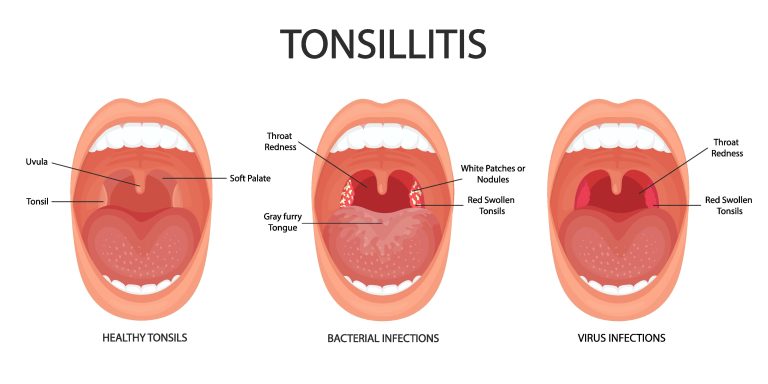Tonsillitis - Causes, Symptoms and Treatment

What is Tonsillitis?
Tonsillitis is an infection caused by inflammation of the tonsils, which are two tiny glands found near the back of the throat. This condition is frequently caused by a viral or bacterial infection, and symptoms include a sore throat, trouble swallowing, fever, and swollen glands in the neck. Read on to learn about the signs and symptoms, causes and treatments available for tonsillitis.
Causes and Transmission of Tonsillitis
Tonsillitis can affect people of all ages, but it is more common in children and teenagers. It is typically spread by droplets from an infected person’s cough or sneeze, or by direct contact with contaminated surfaces.
Signs and Symptoms of Tonsillitis

Tonsillitis signs and symptoms may vary from mild to severe. They include:
- difficulties in eating, drinking and/or speaking
- difficulty in breathing
- abscess formation
- rheumatic fever.
If you or your child is having tonsillitis symptoms, seek medical attention as soon as possible. To identify the cause of your symptoms, your doctor will perform a physical examination, review your medical history, and maybe run some tests if required.
Treatment for Tonsillitis
Tonsillitis is often treated with a combination of medicine and rest. If the infection is bacterial, antibiotics and pain relievers may be prescribed. Consuming plenty of fluids, getting enough rest, and avoiding irritants like smoking can all help to alleviate symptoms and aid healing.
Do Tonsillitis require surgery?
Tonsillitis may require a tonsillectomy, which is the surgical removal of the tonsils in some circumstances. This operation is typically advised to people who have recurring tonsillitis or who have complications such as sleep apnea, trouble breathing, or other health issues.
Can Tonsillitis be prevented?
It is important to have good hygienic practices to reduce the likelihood of contracting tonsillitis. Regular hand washing, avoiding direct contact with sick people, and covering your mouth and nose when coughing or sneezing can all help to prevent the transmission of infection. A healthy lifestyle, which includes eating a balanced diet and exercising on a regular basis, can also help improve your immune system and minimise your chance of getting sick.



